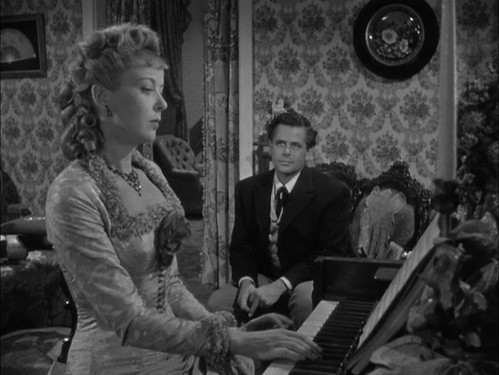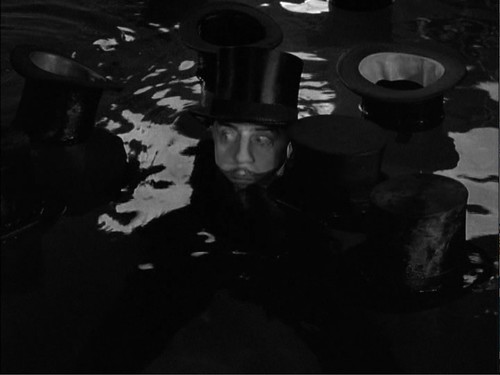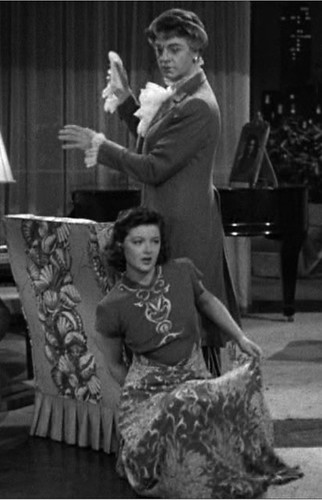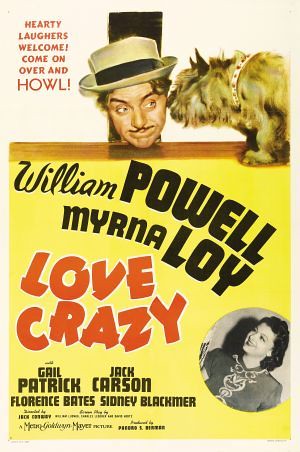Lust for Gold is pretty frustrating to watch, because there's a brilliant, gutsy movie wrapped in a lot of unfortunate fluff. Like The Searchers, there are parts that just don't work and kill the rhythm of the movie. What annoys me is that it's so close to being a great film, and has the makings of a perfect one. Yet it bogs itself down in so much emotionless, derivative, and ultimately unnecessary storytelling that what results is an exceptional 50 minute tale surrounded by 40 minutes I'd rather not watch. The movie tells its story through a flashback, and the problem with this is it's not very economical, especially with a medium like film.
Lust for Gold starts with about 20 minutes of Jacob Walz's grandson searching for a gold mine he, uh, "discovered." What we learn is that Jacob was never the good, wholesome prospector his grandson believed, but stole and murdered his way to riches. The problem with the movie's storytelling is that all the sudden, it has to develop additional characters from several time periods which just gobbles up more time than it should. In film, time is an extremely precious commodity and needs to be managed effectively, unless you want an unnecessarily long and boring picture. Jacob's grandson just isn't that interesting and he's constantly associating himself with his grandfather; he seems too entitled to the gold mine. This makes him into a bit of a snob, and the voiceover doesn't really let us empathize with him, but makes it soundlike he's reading a dry police procedural.
Where this film works is in telling the story of Jacob. Disregarding the grandson portions and considering Jacob's story alone, the movie becomes an embittered tale of greed and heartbreak; the overall tone of this story seems as much like a morally bleak film noir as it does a western. Many of the best westerns plunge into the murky depths of a world where there is no line between right and wrong. Perhaps westerns works so well this way because they are such a primal setting, where law and order still struggle to tame the land.
Jacob is almost perfectly archetypal of the noir hero. He's so haggard when we first see him, it's difficult to actually see Glenn Ford beneath the role. He's not exactly admirable either, as his idea of a good time is scaring little girls with a gun. By the time he gets the gold, he's bumped off the people who led him there and shot his partner in the back. Gold does that to people, doesn't it? He goes back to town to cash in, where all the sudden everyone is abuzz trying to figure out where he got it all. Up until this point, there's no real complexity in his character and his only human quality is his, um, lust for gold. He's greedy and secretive, no different than our old friend Fred C. Dobbs.
Then he meets Julia, and here is where we start seeing some texture and depth brushed into his character beyond greed and murder. Julia, of course, wants to get out of her crappy bakery with her crappy husband, and Jacob is a chance to escape. Whether Julia really loves him is harder to say, in part because Ida Lupino plays her so close to the chest. Lupino makes it clear she doesn't love her husband, but whether she wants to leave because of Jacob or the money is up in the air. She flip-flops so much that by the time she's on the mountaintop begging Dutch to believe her, his doubt and heartbreak overwhelm his real desire: he really does want to believe her.
For Dutch, Julia is the only person in town who doesn't seem to care about the gold. From his point of view, he sees a kind woman taking care of him when the rest of the town took him for a greedy drunk with money. There's that moment when he thanks her in German and when she responds in the same tongue, it's like a light's gone on in his head. In any foreign country, but especially America, I think there's something that touches the heart when you discover a fellow countryman who speaks your native tongue, especially where you least expect it. Dutch has been alone until this point; to the town, he's separate from them—the man with a lot of gold. When he speaks with Julia in German, I think this marks something of a turning point. All the sudden, he no longer cares about the gold but this woman who might possibly be his soul mate. For her, he'll do anything; he'll buy all her bread and throw it away to some kid; he'll clean himself up. When he arrives at her house, groomed and clean-shaven, he's almost unrecognizable with his former self. It was at this point that I said to myself: Aha! There's our Glenn Ford! Once he falls for Julia, I think there's a kind of schoolboy innocence about him; he seems transformed—almost tame.
A movie like Lust for Gold goes to show that many of the differences between westerns and film noir are almost purely superficial; the thematic undertones are often strikingly similar, if not identical. Julia, as a kind of femme fatale, gives Dutch something to work for; she gives his life a purpose. To him, she's something beautiful amidst the jeering townsfolk only interested in his gold. So when he discovers she's really no different than the others, that stability she seems to offer just vanishes. In the finale of Jacob's story—which, for me, should be the finale of the movie—the bottom literally falls out; an earthquake makes it impossible to recover the gold or the life he envisioned with Julia.
Lust for Gold has so much going for it, that it's especially frustrating to see it with all its shortcomings. The movie comes so damn close to being on the highest level that it's almost painful to see Jacob's grandson with his bland voiceover drag down an otherwise superb drama. For all its problems, Lust for Gold should be seen.



